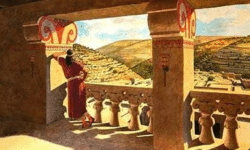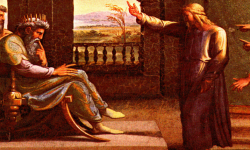God is not mentioned in the book of Esther. He is hinted at when Mordecai talks of providence and also when Esther fasts, but there is no explicit acknowledgment. What can we learn from God’s seeming absence?
God declared that He would live with His people in Israel. His temple was a symbol of dwelling amongst them. But when they persistently rebelled, God removed them from the land. The account of Esther takes place during that exile. God is hidden in the story – just as He had hidden Himself from His people. The Talmud even notes a word play between Esther and astir, which means “to hide.”
It’s important to remember their circumstance in the telling of the story - God was not among them. The story shouts this point by His literary absence. The people had become disobedient and, after failing to heed the cries of many a prophet, God finally thrust them out of the Promised Land. We can see in hindsight though that He was not punishing them, but disciplining them. It was not to destroy His people, but to teach them. And this short book of Esther reinforces that history. God remains true to His promises and He works to protect and preserve them from behind the scenes. His goal is always to restore that which is His. They were faithless, but He remained faithful.
God’s presence is hidden in the book of Esther, like it was to the exiles, but His care and action on their behalf is obvious. When God feels hidden to us, for whatever reason, we can be assured that He is still there – watching, protecting, and teaching. Though He hides His face, He won’t turn His back. And those who recognize His protective care can find always find Him – at work to restore His people.
If we are faithless, He remains faithful, for He cannot disown Himself. 2 Timothy 2:13








2 Responses